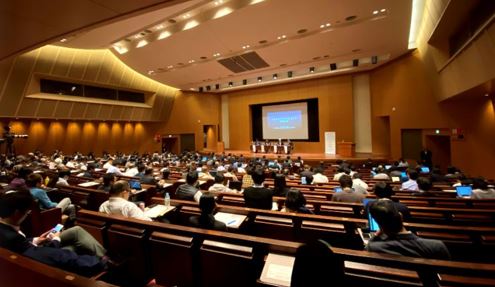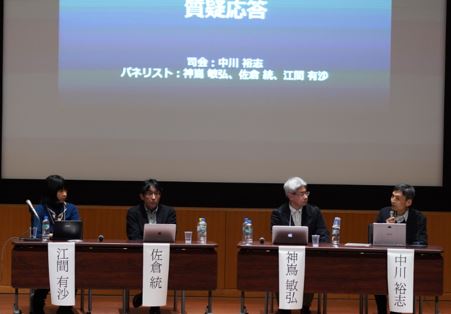On January 9, 2020 the “Symposium on Machine Learning and Fairness” was held in Hitotsubashi Auditorium, Hitotsubashi University, organized by the Japan Society for Artificial Intelligence, Ethics Committee; Japan Society for Software Science and Technology, Machine Learning Systems Engineering Group; and IEICE, Information-Based Induction Sciences and Machine Learning Group.
Currently, the impact of machine learning on fairness in Japan and overseas is attracting considerable public attention. Prior to the symposium, a “statement on machine learning and fairness” was published on December 9, 2019, which declared two important points:
(1) Machine learning is nothing more than a tool to assist human decision making, and
(2) we are committed to improving fairness in society by studying possible uses of machine learning.
In addition, the statement declared that the research community engaged in machine learning technology and research should be more sensitive to social responsibilities and promote open dialogue with all members in society.

Opening
At the opening of the symposium, Hiroshi Maruyama of Preferred Networks, Inc., introduced the background of the statement. Next, representatives of the three societies hosting the conference greeted the audience. Hideaki Takeda of the Japanese Society for Artificial Intelligence first introduced the importance of eliminating misunderstandings regarding machine learning and the ethical guidelines that the society released in 2017. Next, Fuyuki Ishikawa of the Japan Society for Software Science and Technology mentioned the question of “Are we creating the right things?” when developing software, and stated that fairness is an important viewpoint from the perspective of the developer. Finally, Hisatsugu Kashima introduced the efforts of the IEICE, which has supported the technical aspects of machine learning in Japan from the beginning, and proposed that fairness issues also should be discussed along with technological development.
Presentation from speakers
There are various approaches to machine learning and fairness. Toshihiro Kamishima of the National Institute of Advanced Industrial Science and Technology introduced a technological approach to discussing the issue of fairness. Machine learning is a research area that seeks to give computers the ability to learn without explicit programming. Models are created to collect and aggregate data for prediction. However, to consider fairness, it is important to design appropriate data and usage objectives. He gave some examples of how data and model bias can arise.
Next, Osamu Sakura of the University of Tokyo spoke from the perspective of technology within society. From an evolutionary perspective, human cognitive tendencies and value judgments have characteristics that enable a community to operate smoothly. Can machine learning match these characteristics? Today’s artificial intelligence is good at optimization and efficiency improvement, but it challenges the areas where art and emergent properties are required. To use artificial intelligence as a tool, it is important to properly understand the limitations of technology and the design roles between humans and machines.
Finally, Arisa Ema of the University of Tokyo, who is also a member of the Ethics Committee of the Japanese Society for Artificial Intelligence, introduced the activities of various research communities dealing with issues on artificial intelligence and fairness. Since 2016, NPOs/NGOs, industry organizations, academia, and international organizations have collaborated on advocating the principles for the research and use of artificial intelligence. However, such principles may occasionally clash during actual application, for example, privacy and safety, or fairness and accuracy. Therefore, she pointed out that it is important to discuss values with diverse groups of people.
Panel discussions
The panel discussion was moderated by Hiroshi Nakagawa of the RIKEN Center for Advanced Intelligence Project. Based on comments received in advance and during the event, the discussion was held with three panelists.
First, the definition of such terms as fairness, equity, and political correctness was questioned. Fairness (公平) means that there is no bias, whereas equity (公正) involves value judgments, such as what is right and correct. There is a variety of “correctness” that has generally been recognized as politically correct. Nowadays, information such as gender, race, and religion are particularly sensitive areas. Based on where standard values are placed, age and gender discrimination may become a bigger topic than race in certain countries and situations, and vice versa. However, we cannot underestimate such topics simply because they are not illegal or a specific policy issue. To this end, as a first step, it is important to consider whether the data and models handled are fair.
Another question was asked regarding how researchers and companies should approach the issue of fairness when developing specific services. There are various approaches to fairness, such as whether we should emphasize fairness in the process or in the results. The trolley problem has become a famous ethical question, but now that autonomous driving technology is in place, it has become not only an ethical issue but also a legal one. As far as the trolley problem is concerned, some engineers think that the design itself, in which such a problem is questioned, is poor (a bad design). It is important to think about fairness not only through ethics but also through the law, technology, and dialogue with society.
Over 300 people participated in this event. Many of the participants were from companies, and it was apparent that fairness has attracted attention not only as the “principles for developing artificial intelligence” but also as one of the factors that must be considered when implementing technology into society. For this reason, we need to create a platform to discuss the fairness of machine learning not only with researchers developing technology, but also with legal departments, public relations departments, sales staff, and users. This symposium was supported by interdisciplinary and international organizations, and the panel concluded that it is important to continue this dialogue.

Next step
Materials and lecture videos by the speakers are available on the symposium website. Machine learning technology is expected to make rapid progress, along with various social and policy initiatives. As of 2020, such efforts have only just begun in Japan. We hope that this statement and symposium will serve as an opportunity to promote general discussions on machine learning and fairness, not only at academic conferences, but also through collaboration with industries and policymakers, and among society as a whole.
Written by Arisa EMA

